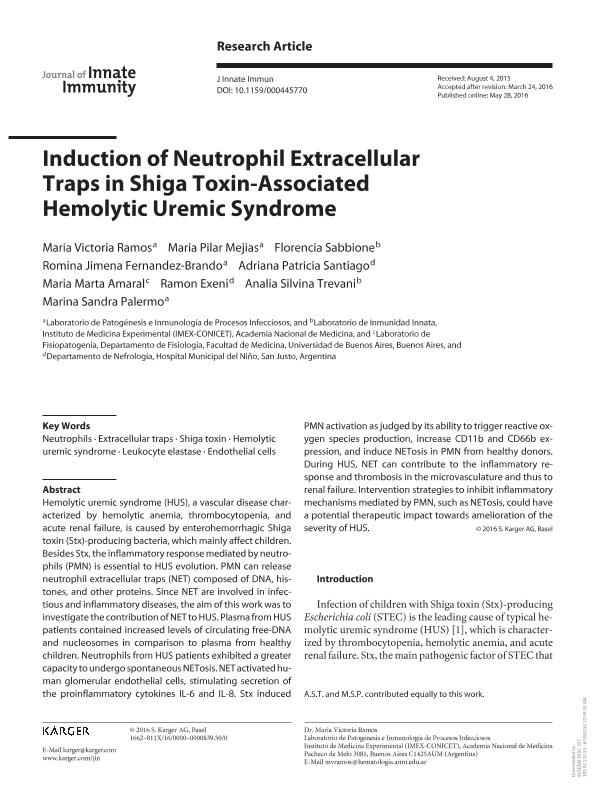Artículo
Induction of Neutrophil Extracellular Traps in Shiga Toxin-Associated Hemolytic Uremic Syndrome
Ramos, Maria Victoria ; Mejias, María Pilar
; Mejias, María Pilar ; Sabbione, Florencia
; Sabbione, Florencia ; Fernández Brando, Romina Jimena
; Fernández Brando, Romina Jimena ; Santiago, Adriana Patricia; Amaral, María Marta
; Santiago, Adriana Patricia; Amaral, María Marta ; Exeni, Ramon; Trevani, Analía Silvina
; Exeni, Ramon; Trevani, Analía Silvina ; Palermo, Marina Sandra
; Palermo, Marina Sandra
 ; Mejias, María Pilar
; Mejias, María Pilar ; Sabbione, Florencia
; Sabbione, Florencia ; Fernández Brando, Romina Jimena
; Fernández Brando, Romina Jimena ; Santiago, Adriana Patricia; Amaral, María Marta
; Santiago, Adriana Patricia; Amaral, María Marta ; Exeni, Ramon; Trevani, Analía Silvina
; Exeni, Ramon; Trevani, Analía Silvina ; Palermo, Marina Sandra
; Palermo, Marina Sandra
Fecha de publicación:
06/2016
Editorial:
Karger
Revista:
Journal of Innate Immunity
ISSN:
1662-811X
Idioma:
Inglés
Tipo de recurso:
Artículo publicado
Clasificación temática:
Resumen
Hemolytic uremic syndrome (HUS), a vascular disease characterized by hemolytic anemia, thrombocytopenia, and acute renal failure, is caused by enterohemorrhagic Shiga toxin (Stx)-producing bacteria, which mainly affect children. Besides Stx, the inflammatory response mediated by neutrophils (PMN) is essential to HUS evolution. PMN can release neutrophil extracellular traps (NET) composed of DNA, histones, and other proteins. Since NET are involved in infectious and inflammatory diseases, the aim of this work was to investigate the contribution of NET to HUS. Plasma from HUS patients contained increased levels of circulating free-DNA and nucleosomes in comparison to plasma from healthy children. Neutrophils from HUS patients exhibited a greater capacity to undergo spontaneous NETosis. NET activated human glomerular endothelial cells, stimulating secretion of the proinflammatory cytokines IL-6 and IL-8. Stx induced PMN activation as judged by its ability to trigger reactive oxygen species production, increase CD11b and CD66b expression, and induce NETosis in PMN from healthy donors. During HUS, NET can contribute to the inflammatory response and thrombosis in the microvasculature and thus to renal failure. Intervention strategies to inhibit inflammatory mechanisms mediated by PMN, such as NETosis, could have a potential therapeutic impact towards amelioration of the severity of HUS.
Archivos asociados
Licencia
Identificadores
Colecciones
Articulos(IFIBIO HOUSSAY)
Articulos de INSTITUTO DE FISIOLOGIA Y BIOFISICA BERNARDO HOUSSAY
Articulos de INSTITUTO DE FISIOLOGIA Y BIOFISICA BERNARDO HOUSSAY
Articulos(IMEX)
Articulos de INST.DE MEDICINA EXPERIMENTAL
Articulos de INST.DE MEDICINA EXPERIMENTAL
Citación
Ramos, Maria Victoria; Mejias, María Pilar; Sabbione, Florencia; Fernández Brando, Romina Jimena; Santiago, Adriana Patricia; et al.; Induction of Neutrophil Extracellular Traps in Shiga Toxin-Associated Hemolytic Uremic Syndrome; Karger; Journal of Innate Immunity; 8; 4; 6-2016; 400-411
Compartir
Altmétricas



